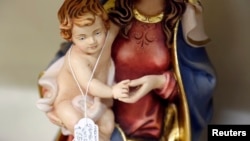VATICAN CITY —
Even “poor” saints will benefit from Pope Francis' drive to control costs and introduce a sense of sobriety and accounting transparency in the Vatican.
The Vatican newspaper said on Tuesday that the Holy See department that oversees the making of saints had introduced a “price list,” or a rough guide to the costs of sanctity.
It will clearly inform dioceses, associations or orders of priests and nuns who promote sainthood causes for deceased people considered to have been holy during their lifetime what they can expect to spend.
Gathering historical evidence, witnesses and lawyers to prove to the Vatican that a person was a saint can be expensive, a fact that has favored those dioceses or orders of priests and nuns with more money.
The newspaper said there were plans to establish a fund to help defray expenses for those dioceses or religious orders that did not have much financial backing for the process. The newspaper called these “poor causes.”
The newspaper, which gave few details, said the guide had come into force at the start of the year and that its goal was to instill a sense of “sobriety and fairness” to the process.
The head of the Vatican department that oversees the making of saints, Cardinal Angelo Amato, told a conference on Monday that more would be made public about the costs, and that they would be more uniformly applied than in the past.
The procedure to make a saint can last anywhere from a few years to a few centuries.
The late Pope John Paul II will be declared a saint in May, a mere nine years after he died in 2005. His progression to sainthood is the fastest in modern times.
The Vatican newspaper said on Tuesday that the Holy See department that oversees the making of saints had introduced a “price list,” or a rough guide to the costs of sanctity.
It will clearly inform dioceses, associations or orders of priests and nuns who promote sainthood causes for deceased people considered to have been holy during their lifetime what they can expect to spend.
Gathering historical evidence, witnesses and lawyers to prove to the Vatican that a person was a saint can be expensive, a fact that has favored those dioceses or orders of priests and nuns with more money.
The newspaper said there were plans to establish a fund to help defray expenses for those dioceses or religious orders that did not have much financial backing for the process. The newspaper called these “poor causes.”
The newspaper, which gave few details, said the guide had come into force at the start of the year and that its goal was to instill a sense of “sobriety and fairness” to the process.
The head of the Vatican department that oversees the making of saints, Cardinal Angelo Amato, told a conference on Monday that more would be made public about the costs, and that they would be more uniformly applied than in the past.
The procedure to make a saint can last anywhere from a few years to a few centuries.
The late Pope John Paul II will be declared a saint in May, a mere nine years after he died in 2005. His progression to sainthood is the fastest in modern times.








